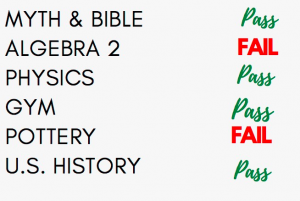Teachers maintaining logical, fair hybrid grading policy essential
Online learning and the hybrid model has changed the way students learn and teachers teach. For that reason, it is necessary that teachers recognize the struggles of managing online learning while they are grading.
Many students have had the displeasure of walking into class on the first day of school and hearing their teacher use phrases such as “I don’t give out A’s very often,” or, “You’re going to have to really work for your grade in my class.” The teacher will claim that the scarcity of perfect grades given in their class will only incentivize students to work harder, when in reality, it does the opposite.
When teachers grade too harshly for the rigour of the course they teach and threaten students with the rarity of receiving an A, students are immediately discouraged and, in my experience, become disinterested in the class.
Over the years of my education, I have had multiple teachers who have done this. While in theory, it seems as though it would encourage students to work harder, it only limits them. Students are limited because they feel that hard work doesn’t pay off in the class and that their extra effort won’t be recognized, therefore there is no point in trying. However, by assigning more difficult work and grading generously, with effort and difficulty of the assignment in mind, students may feel more motivated to work hard and teachers will still be holding them to a higher standard of work.
Never has a teacher withholding the grade I deserve been successful in motivating me to work harder on my next assignment. To the contrary, I no longer see the point in pouring effort into an assignment that is going to land me with a B no matter what.
However, I have noticed that when teachers assign something that is more challenging and time consuming, yet they grade generously, I am a more productive and motivated student. This could be used as an alternative for teachers who strive to make their class more challenging.
At the end of the day, grades should only be a reflection of how much effort the student puts into the class and their ability to retain and apply what they have learned. For this reason, harsh grading systems are not an accurate reflection of the student.
Let’s assume, for example, that a student’s quarterly grade is made up of mostly test grades and the occasional homework assignment. If the homework assignments are graded for completion, and the student completes the homework in its entirety, that grade should go into Powerschool as a 100% rather than a 95%. For example, many of my teachers will give a 9.5/10 for a completion based homework assignment rather than a 10/10. The same applies to participation grades and other assignments graded for completion.
If teachers begin to grade with the logic that grades should reflect a student’s effort and knowledge, we will feel more incentivized to work hard, turn in assignments on time and pay attention in class.
It has never been more important than it is now for teachers to be generous and understanding with students’ grades. Due to the pandemic, school looks completely different from how it used to. Keeping this in mind as well as the true meaning behind grades while teachers are scoring assignments could make a big difference in how students view school and their motivation to learn.

Breaking News Editor Tierney Kugel ’22 has a strong passion towards her lifestyle choice, and better yet, loves to write about it. As a vegetarian, she...






















































